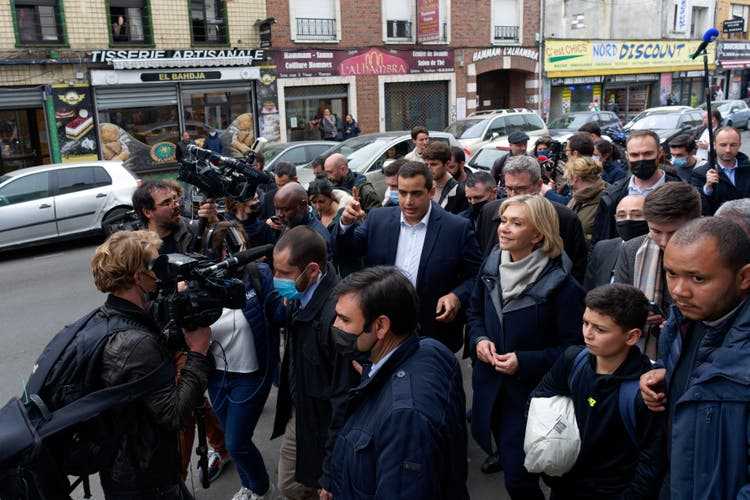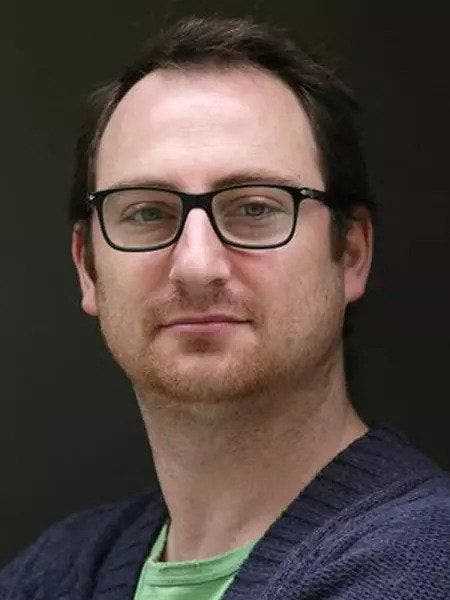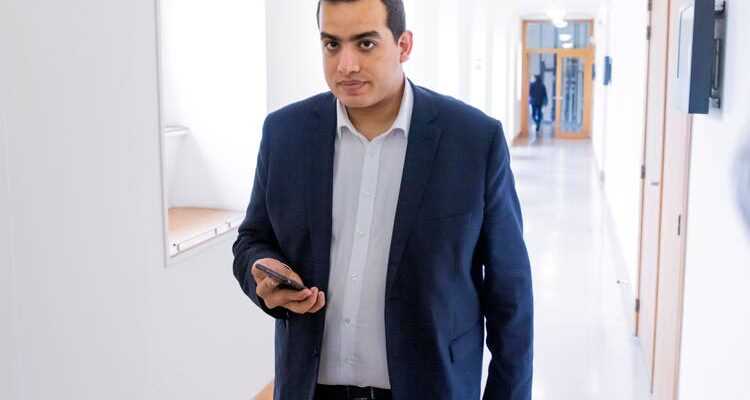Roubaix has been fighting its negative image for years. A TV show about fundamentalist Islam showed how politics is being dealt with – and how difficult it is to fight Islamism.
Rue de Lannoy used to be one of the most famous shopping streets in Roubaix. People came from far away to stock up on high-quality textiles. Roubaix was once the center of the French textile industry – until one factory after another closed during the 1980s. Today, some of the brick houses on Rue de Lannoy look a little run down. All sorts of things are sold in the shops: mobile phone accessories, bric-a-brac, sewing tools and specialties from the Périgord. But also halal meat, full body veils as well as dolls and stuffed animals without a face.
The latter caused a nationwide sensation at the end of January. Journalists from the private broadcaster M6 had filmed in a shop with a hidden camera. According to the seller, there was no doubt that the toys would appeal to adherents of a strict interpretation of Islam: The dolls have no faces because only Allah is allowed to depict faces, she explained.
Of the TV report focused on places where rigorous forms of Islam become visible: in private schools, where even kindergarten children study the Koran; in restaurants where veiled women can eat in boxes hidden from view; or at a university where devout students are discussing the best places to pray in secret.
Threatened with death because he denounced the circumstances
Roubaix was only one of three locations. But nobody has been talked about or polemicized about since the broadcast of the show. This is mainly due to Amine Elbahi. In the documentary, the 25-year-old steers his car through the Rue de Lannoy and explains how the area has changed over the past five years: There are significantly more oriental grocery stores, but also shops that sell said toys and Islamist literature .
Amine Elbahi knows from her own family what radical Islam can do. He warns that the French state’s inaction will have serious consequences.
Elbahi warns that what these stores offer is in a way a call for shoppers to shut themselves out of the national community. It feeds Islamism. If the French state doesn’t do anything about it, it will pay dearly in a few years.
A few weeks later, Elbahi is sitting in a café in Paris. Two plainclothes police officers have discreetly seated themselves on the terrace. Since the show, the 25-year-old lawyer has been threatened with death, as has the journalist who moderated. Elbahi, wearing a dark turtleneck sweater under a dark suit, looks exhausted. Not only the press, but also politicians are trying to get him. It’s an election campaign in France. Someone like Elbahi – young, fearless, clear in his statements – is a sought-after draft horse for those who count the fight against Islamism among their priorities.
In the conversation, Elbahi argues in a differentiated manner, but is no less worried. The conditions shown in the TV report are not unique to Roubaix, he says. They showed the total failure of the state in the face of so-called Islamist separatism. Emmanuel Macron’s government has done too little to put a stop to extremist currents.
The lawyer’s commitment did not just begin with his appearance on television. Six years ago, one of his sisters traveled to Syria to join the Islamic State fighters. Today she lives with her two children in a refugee camp near the Turkish border. Even then, Elbahi wrote articles in the national press. He warned that the Salafists would win the ideological war in the quarters from which the state was withdrawing. Because now they are the ones supporting poor families, teaching children to read and taking over crime prevention. Even then, Elbahi criticized politics: They closed their eyes for the sake of social peace.
Elbahi’s allegations have remained the same – but his evidence is even more concrete today. He found out that the municipality of Roubaix supported an association that lets children learn Koranic suras in private lessons: state-subsidized Koranic lessons. In 2020 alone, the association was awarded around 65,000 euros. Prosecutors have found the evidence Elbahi provided – prayer calendars and exercise books that the children had to use to learn Koranic suras – to be credible. The mayor who ignored Elbahi’s allegations has been charged. In autumn he has to answer in court for misappropriation of public funds through negligence. The association had to give up its activities.
Favors from a local politician to an Islamist association
In the city where Elbahi grew up in modest circumstances with five siblings and his mother, who is from Algeria, the TV show stirred up a lot of dust. Some people who are asked about it roll their eyes: negative headlines again. Several shopkeepers on the Rue de Lannoy have denied the accusation that their neighborhood is in the hands of Islamists.
Elbahi is rarely there these days and weeks. And when he does, he campaigns for Valérie Pécresse, the Conservative candidate. And a bit for himself too. In June he hopes to get a seat in Parliament. He recently accompanied Pécresse through the rue de Lannoy. Along with the right-wing extremist Éric Zemmour and the right-wing populist Marine Le Pen, she is the only one working on the topic of radical Islam.

At the end of March, Valérie Pécresse campaigned in the rue de Lannoy, accompanied by a crowd of journalists and Amine Elbahi (on Pécresse’s left).
Since the outbreak of the Ukraine war, it has hardly played a role in debates about the future of the country. Pécresse stated in front of the assembled press that nothing had changed since the television report was broadcast. If elected, she will give the prefects more funds to close shops that sell things that go against the values of the republic. After a good half hour she was gone again.
Bruno Renoul, a journalist with the newspaper “La Voix du Nord”, has dealt with the topic for a long time. He followed Elbahi’s leads and researched the club in question for more than a year. Its founder was the former head of a Koran school in the Salafist mosque in Roubaix.
According to Renoul’s research, he continued teaching in an organization defined as secular that allegedly gave private tuition at school. So he could apply for government subsidies. Some parents didn’t even realize there was an organizational change, says Renoul.
It seems strange to him that the mayor didn’t want to know anything about what he was able to find out as a journalist. The politician also did not react to the advice of Amine Elbahi and the prefecture. Renoul’s suspicion: The mayor didn’t want to spoil things with the Muslims in the city because they represent a considerable electoral base. According to estimates – there are no official surveys – at least 40 percent of the inhabitants of Roubaix are of Muslim faith.
Renoul has been working in Roubaix for ten years. As a local journalist, you can’t avoid topics related to Islam, he says. There were just as few threats and accusations of being Islamophobic. Yes, there are problems with radical Islam, and they have existed in the past: for example, through jihad travelers or the appearance of controversial preachers, he specifies. But they concern a minority. Renoul is annoyed that it was mainly the faceless dolls that shaped the public debate after the documentary was broadcast. Apart from the fact that these are also sold elsewhere and that this is not prohibited, the debate has missed the real problems.
He doesn’t just mean the “cowardice” of the mayor, who has broken with the local newspaper since Renoul’s research. Roubaix is one of the poorest cities in France: Around 43 percent of the almost 100,000 inhabitants have to make do with less than 1100 euros a month, around 31 percent are unemployed. Roubaix was once a prosperous city, «the continental European Manchester». The spacious industrial villas bear witness to this to this day. Some of the once more than 300 chimneys are still standing. The downward spiral began in the 1970s. Most textile factories closed their doors, but the workers, who had come with their families mainly from North Africa, stayed – even without work.
A city under surveillance
Both the municipality and the state have invested heavily in enhancing the city’s special heritage; for example in the Musée d’Art et d’Industrie in the former art deco bath. And there are still large companies in the area: the mail order company La Redoute, for example, or OVH, one of the largest cloud service providers in Europe. Nevertheless are for almost a third of households State benefits are the only income. All social indicators are weak, says Renoul. He also means the lower life expectancy – for men it is 2.8 years below the national average. Or the school performance of the children. Almost 50 percent of the students take the path of vocational training (“bac pro”) after college. This still enjoys little prestige in France.

In view of these figures, the Roubaix government has long been paying close attention. Roubaix is the only municipality in France to have its own sub-prefect who coordinates and monitors state tasks in the city – for example in the areas of education, health and security. Two years ago, the Center for the Prevention of Radicalization also dedicated a study to Roubaix and Maubeuge. The two cities have similar histories of deindustrialization and high numbers of Muslim immigrants. And both are suspected of being a haven for Salafists.
The authors of the study conclude that Salafism is more present in Roubaix than in Maubeuge. This becomes visible on a Friday afternoon near the Salafist mosque: practically only bearded men in ankle-length dresses can be seen on the streets. One of the authors of the study sees the reasons for this not only in the poor economic situation of the residents. Also the extreme segregation of the different population groups prepare fertile ground for Salafism. Young people with no future prospects in particular are attracted to the rigorous interpretation of Islam because it gives them an identity. According to the report, there are at least nine mosques in Roubaix, most of which are under the influence of foreign states.
In 2020, the government passed a package of laws that, among other things, aims to put an end to the practice of imams sent from Muslim countries by 2024. It has also allowed increased control of places of worship; around thirty have been closed since then. In part, however, only temporarily.
But the Roubaix case also shows the limits of the new legal situation. The restaurant with the boxes for veiled women is now closed – in case of doubt, hygienic deficiencies can be raised in catering establishments. The shop, which sells, among other things, the faceless dolls, is still open. He doesn’t do anything that is against the law.
